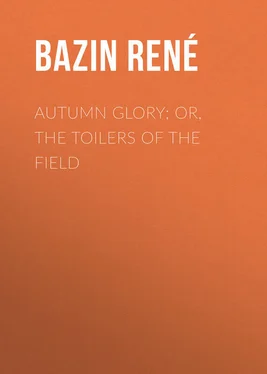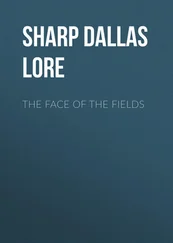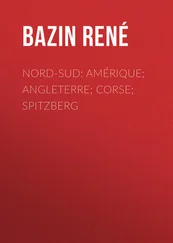René Bazin - Autumn Glory; Or, The Toilers of the Field
Здесь есть возможность читать онлайн «René Bazin - Autumn Glory; Or, The Toilers of the Field» — ознакомительный отрывок электронной книги совершенно бесплатно, а после прочтения отрывка купить полную версию. В некоторых случаях можно слушать аудио, скачать через торрент в формате fb2 и присутствует краткое содержание. Жанр: foreign_language, foreign_antique, foreign_prose, на английском языке. Описание произведения, (предисловие) а так же отзывы посетителей доступны на портале библиотеки ЛибКат.
- Название:Autumn Glory; Or, The Toilers of the Field
- Автор:
- Жанр:
- Год:неизвестен
- ISBN:нет данных
- Рейтинг книги:3 / 5. Голосов: 1
-
Избранное:Добавить в избранное
- Отзывы:
-
Ваша оценка:
- 60
- 1
- 2
- 3
- 4
- 5
Autumn Glory; Or, The Toilers of the Field: краткое содержание, описание и аннотация
Предлагаем к чтению аннотацию, описание, краткое содержание или предисловие (зависит от того, что написал сам автор книги «Autumn Glory; Or, The Toilers of the Field»). Если вы не нашли необходимую информацию о книге — напишите в комментариях, мы постараемся отыскать её.
Autumn Glory; Or, The Toilers of the Field — читать онлайн ознакомительный отрывок
Ниже представлен текст книги, разбитый по страницам. Система сохранения места последней прочитанной страницы, позволяет с удобством читать онлайн бесплатно книгу «Autumn Glory; Or, The Toilers of the Field», без необходимости каждый раз заново искать на чём Вы остановились. Поставьте закладку, и сможете в любой момент перейти на страницу, на которой закончили чтение.
Интервал:
Закладка:
"Father, they are lovers!" As a whispered breath the words came to the father's ear.
Rage at the happiness of others had distorted the younger man's features. Toussaint Lumineau looked down at the face raised to his, so white in the moonlight, and was struck by the air of suffering it wore.
"If you watched them as I do," continued his son, "you would see that though they never speak to each other indoors, outside they always contrive to meet. I have often caught them talking and laughing together like acknowledged lovers. You do not know that Jean Nesmy; he is audacity itself. He lets you think that he likes shooting, and I do not say but what he may, but he does not carry his love for it to that extent, I'll be bound. Is it only for his own pleasure that he is off to the far end of the Marais to shoot plovers; only for his own pleasure that he risks malarial fever fishing for eels; that he spends whole nights out after being hard at work all day? No, I tell you, it is for Rousille, for Rousille, for Rousille!" His voice had risen, it could be heard from within the house.
"I will be on the watch, my boy," returned his father soothingly, "do not you worry yourself."
"Ah, if I were you, I would go at dawn to-morrow along the road to the Marais, and if I caught them together…"
"Enough!" exclaimed his father, "you do yourself no good by so much talking, Mathurin. Here is Eléonore coming to help you in."
Eléonore had come, as usual, to help Mathurin up the steps, and unlace his boots. No sooner did she touch his arm than turning, he went in with her. The sound of crutches and of footsteps died away; the father was alone again.
"Come," he thought aloud, "if this be true, I will not suffer the laugh to last long against me in the Marais!" He drew in a deep breath of pure air, as though it were a bumper of wine, then to make sure that Rousille had not gone out again, he entered the house by the door in the middle, which was that of his daughter's bedchamber. All was dark within; a ray of moonlight fell across the well-waxed wardrobes furnishing the sides of the room – wardrobes always kept in perfect order by Eléonore and Rousille. The farmer felt his way round the huge walnut wood one which had formed his mother's dowry, had crossed the room, and was making his way out into the kitchen communicating with the large living-room where he and Mathurin slept, when behind him, in the angle of a bed, a shadowy form arose:
"Father!"
He stopped.
"Is it you, Rousille? Are you not in bed?"
"No, I was waiting for you. I wanted to say something to you." They were separated by the length of the room; the darkness was too great for them to see each other. "As François cannot give you his money, I have been thinking that I will give you mine."
"You are not afraid then that I shall not repay you?" the farmer asked harshly.
The girlish voice, as if discouraged by this reception, and checked in its enthusiasm, replied timidly:
"I will go to-morrow to fetch it … the Michelonne's nephew has it… I will, indeed, and you shall have it the day after to-morrow."
If a tear rolled down his cheeks, the farmer was unaware of it; he passed on into his own room.
Some minutes later, when Eléonore came into the room, a lighted candle in her hand, Marie-Rose was no longer beside her bed, but was standing before the open windows looking out on to the courtyard.
The farmhouse stood upon an eminence, and from this window there was a view over the low wall, and through the arched gateway to the slopes beyond, and even across the sedge-covered Marais.
The sisters often undressed without exchanging a word. Rousille was gazing straight before her into the clear moonlight; her accustomed eye could distinguish objects by it almost as accurately as by the light of day. Immediately beyond the wall came a group of elms, under shelter of which stood carts and ploughs, then a stretch of land lying fallow, and beyond that again the broad flat expanse of marshland, across which on most nights would come now faintly, now loudly, the sound of the roll of the ocean, as of some far-off chariot that never stopped. The immense grassy plain looked blue in the darkness; here and there the water of a dyke shone in the moonlight. A few distant lights, a window lit up, pierced the veil of mist that spread over the meadows. Unerringly Rousille could name each farmstead to herself by its beacon light, similar to that on the mast-head of a ship riding at anchor; La Pinçonnière, La Parée du Mont, both near; further away, Les Levrelles; then so distant that their lights were only visible at intervals, like tiny stars, La Terre-Aymont, La Seulière, Malabrit, and the flour-mill of Moque-Souris. By a group of starry points on the right, she could discern the town of Sallertaine standing out on an invisible mound in the middle of the Marais. Somewhere about there Jean Nesmy was wading among the reeds, for love of Rousille. So she continued to think of him; she seemed to see him so far, so very far away, amid the dreamy shadows, and her lips pressed together, then parted in a long, silent kiss.
There was a sudden swish of wings over the tiles of La Fromentière.
"Do shut the window, Rousille," said Eléonore, waking up. "It is the turn of the night, and blows in cold."
The sky was clear, the clouds had dispersed. The lights of Moque-Souris were extinguished; those of Sallertaine had gradually diminished like a bunch of currants pecked by birds.
"Until to-morrow, my Jean, in the dwarf orchard," murmured Rousille. And slowly, musingly, the girl began unfastening her dress by the light reflected from her white sheet, her young heart filled with dreams of youth.
CHAPTER III.
THE DWARF ORCHARD
Towards four o'clock the stars began to fade in the sky, the first signs of daybreak to appear. A cock crowed. It was the same golden-feathered cock, with fiery eyes under his red crest, that crowed every morning. Marie-Rose had reared him. Now hearing it she thought, "Thank you, little cock!" Then began to dress quietly, for fear of rousing Eléonore, who still slept soundly.
She was quickly ready, and crossing the courtyard, turned to the left past the ruined wall by a grassy path on the farm property, strewn with fallen branches, which led down to the Marais. About some hundred yards from La Fromentière all vegetation abruptly ceased, and one came upon a low wall grown with lichen and moss, surrounding an orchard of about an acre in extent. Rousille, pushing open a gate in the middle of the wall, entered.
It was a curious sight, this dwarf orchard. The cider apple and pear trees with which it was planted had never been able to grow higher than the top of the wall on account of the strong winds that blew from the sea. Their stems were thick and gnarled, their branches all bent and driven towards the east; leafless above, they met and over-arched beneath. Looking at it from outside one simply saw a billowy mass of bare branches; but on making one's way down the central path, one found oneself in a leafy shade some four feet high, safe from inquisitive eyes, from rain and heat, and from the gales which sweep over the Marais. It was a sailor's folly, such as might be found in far-off isles. As a child, it had been Rousille's playground; now grown up, it was here she had come to meet her betrothed.
Entering, she stooped and made a path for herself towards the western wall, then sitting upon the forked branch of an apple-tree, hidden among them like a partridge in a corn-field, she gazed out upon the vast plain along which Jean Nesmy must come.
At this early hour the Marais was covered with mists which did not rise, but parted ever and anon, undulating in the breeze. The solitude was unbroken, the atmosphere light, sensitive, nervous, carrying the faintest sound without diminution. The bark of a dog at Sallertaine came to her ears as if it were beside her. Great square corn-fields that looked like patches of grey fur stitched together faded away into nothing in the distance. Here and there canals, cutting each other at right angles, looked like tarnished mirrors, the mist curling in smoke above them. Then vaguely from out the fog darker outlines began to appear, like oases in the desert; they were farmhouses built on the low-lying ground of the marshland, with their outbuildings and groups of poplars to lend shade. Now the undulating veil of mist began to rise, rays of light touched the grasses, sheets of water sparkled like windows in a setting sun. For many a league, from the bay of Bourgneuf to Saint Gilles, the Marais of La Vendée had awakened to the light of a fresh day.
Читать дальшеИнтервал:
Закладка:
Похожие книги на «Autumn Glory; Or, The Toilers of the Field»
Представляем Вашему вниманию похожие книги на «Autumn Glory; Or, The Toilers of the Field» списком для выбора. Мы отобрали схожую по названию и смыслу литературу в надежде предоставить читателям больше вариантов отыскать новые, интересные, ещё непрочитанные произведения.
Обсуждение, отзывы о книге «Autumn Glory; Or, The Toilers of the Field» и просто собственные мнения читателей. Оставьте ваши комментарии, напишите, что Вы думаете о произведении, его смысле или главных героях. Укажите что конкретно понравилось, а что нет, и почему Вы так считаете.












